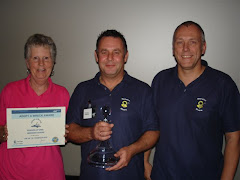More for your safety training:-
RIDDOR - The Reporting of Injuries, Diseases and Dangerous Occurrences Regulations 1995, did you know that certain injuries or occurences in work situations are reportable to the Health & Safety Executive ? This is in addition to any diving agency reporting requirements.
Decompression illness is a reportable disease under the Regulations and reportable dangerous occurences (near misses) include failure or endangering of diving equipment, the trapping of a diver, an explosion near a diver, or an uncontrolled ascent.
To learn more about RIDDOR and how to make a report click HERE
14 October 2008
Subscribe to:
Post Comments (Atom)



5 comments:
Some good points Chris.
I would like to add that a diving incident can happen to anyone regardless of how experienced you are. Keep current, practice skills at every opportunity,update your training. Good to hear that the guys at the weekend are all ok and will be back in the water soon and again well done to the crews for their rapid and cautionary action. Everybody can learn from incidents like this regardless of the outcome and experience level I repeat this sort of thing can happen to all of us.
Too true Tad! There have been (sadly) plenty of divers & instructors put on to O2 that I am personally aware of and some that have been potted! I've seen a wide variety of responses to suspected problems, different places/people have different ways of handling it but you can never fault taking the safest option. Better safe than sorry!
My thanks to the 'Anon' responses. This blog is widely read but it's always very nice to get positive feedback from non-Mders.
Yes, as per the posting, RIDDOR applies to at work diving. Most UK PADI certified divers (and many other divers besides) will have been trained by 'at work' recreational diving teams.
I share your hope that reports under RIDDOR will be few and far between. But the RIDDOR process does allow for incidents to be examined for the benefit of future safety and , of course, takes reports from any source , not just a single agency. BSAC publishes detailed incident data reported to it but PADI doesn't. PADI and the HSE have jointly published safety guidance and both are members of the British Diving Safety Group (link on this blog)so there is every reason to anticipate that PADI International will continue to work with the HSE on improving safety. I hope so. I'd dearly like PADI to include training on UK safety requirements in their UK Dive Master & above courses. PADI at Bristol have written to me in the past in respect of this. In the meantime the blog helps raise awareness.
I got some light-hearted stick at work from colleagues bemoaning free helicopter rides for divers, of course we'd hope that many other acute cases (eg road crashes) get air-lifted to treatment where necessary, so divers are no different in terms of getting urgent treatment. Of course minimising expensive emergencies is the name of the game and that's where RIDDOR comes in.
It is always pleasing to see dive centres and instructors taking initiative and utilising the internet as a communication tool to their students.
PADI professional courses, such as the Divemaster and Instructor Development Course, include training on health and safety requirements and risk management practises. PADI has also provided advice and recommendations relating to the Diving at Work Regulations 1997. These recommendations can be obtained from the Training Department by any PADI member. PADI holds member forums and risk management seminars for its members. If a PADI member has a question or concern relating the training practises within the UK, they may wish to contact the training department at training@padi.co.uk
Suzanne, thank you for your comments and your offer to PADI members to provide advice. Thank you too for taking a keen interest in Meridian Divers , the blog, and our Adopt A Wreck project.
Post a Comment